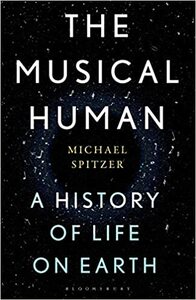Take a photo of a barcode or cover
informative
slow-paced
Awful awful book. If Spitzer just stuck to talking about music it would be fine, even considering his clearly biased and terrible representation of western music. However, he decided to venture into biology and evolution and language, and many other fields- for which it is extremely clear all Spitzer did was search up random studies that included music, gave it a cursory look- then quoted them to further his incoherent argument. Absolute waste of time.
Abandoned on page 64 of 394. It would clearly help if I knew more about music but also the author jumps about too fast. He has some overall plan but it seems too complex for a book.
A deep and highly interesting history of sounds on earth.
I learned a lot about the different kinds of sounds living organisms produce on earth. The reasons, the possibilities, the limits.
Entertainingly and amusingly Spitzer takes us through the different kinds of music we know about. Finally a book that does not focus on western, classical and pop music, but widenes the view for all the cultural approaches to music we know about.
I do not agree with all of his conclusions, but this book is so interesting and enlightning - I can only recommend for everyone - not just lovers of divers music and human history.
I learned a lot about the different kinds of sounds living organisms produce on earth. The reasons, the possibilities, the limits.
Entertainingly and amusingly Spitzer takes us through the different kinds of music we know about. Finally a book that does not focus on western, classical and pop music, but widenes the view for all the cultural approaches to music we know about.
I do not agree with all of his conclusions, but this book is so interesting and enlightning - I can only recommend for everyone - not just lovers of divers music and human history.
Quite a bit of the book was fascinating and I learned a great deal. But I git bog downed by the technical language.
The narrative wanders and is hard to keep track of. The author also tried to diagnose Mozart as being on the autism spectrum because he knew the musical rules of his time period.
Moderate: Ableism
What could be more human than music? From babies to football crowds to concern performers and Spotify listeners, almost all of us participate or partake in music in some way. And few animals have anything remotely comparable. And yet, music has been overlooked as part of human evolution, dismissed by some as “auditory cheesecake”, “a delightful dessert” in contrast to the “main dish” of language. This fascinating book sets that record straight - piling up layer upon layer of compelling evidence that music is in fact fundamental to humanity.
We're given three timelines - the human life, from infancy to old age; the history of music from the earliest humans to the present day; and an evolutionary scale, from animals to AI. Each on its own is fascinating, and could easy have formed three separate books. But the combination of all three together makes this stand out as a remarkable achievement - the culmination of many years of study as one of the world's leading musicologists.
Beyond the broad sweep of history, the book is also endlessly rich in the detail. The nature of whale song and bird song, the musical story of Liverpool of a city, and the description of non-western contrapuntal music stood out for me, though I'm sure other readers will find their own favourites in this vast and rich pool.
As a keen amateur musician with a passable prior knowledge of music history, I found the book (mostly) accessible and clear. A few times, however, the author's academic background showed through in dense and obtuse prose that pushed the limits of what can be demanded of the "intelligent general reader". As a result, I was sometimes left in doubt as to whether a particular leap of logic was truly justified by the evidence.
Nevertheless, even the challenging passages leave me wanting to know more. I will surely be coming back to this book for years to come.
Early on, the author invites us to ask Beethoven, Duke Ellington and Nusrat Ali Khan where their music came from. "Their answers would not be as far apart as you might think," we're told. "It doesn't mean a thing if it doesn't swing, says Ellington. From the heart, may it go to the heart, answers Beethoven. According to Khan, One must be willing to release one's mind and soul from one's body to achieve ecstasy through music. They are saying that music is about life, emotion and the spirit. That what pours out of music can't be pinned down to the notes. That music is essentially human, and that it makes us human."
- - - -
Many thanks to NetGalley and the publishers for an advance review copy provided in return for an honest review.
We're given three timelines - the human life, from infancy to old age; the history of music from the earliest humans to the present day; and an evolutionary scale, from animals to AI. Each on its own is fascinating, and could easy have formed three separate books. But the combination of all three together makes this stand out as a remarkable achievement - the culmination of many years of study as one of the world's leading musicologists.
Beyond the broad sweep of history, the book is also endlessly rich in the detail. The nature of whale song and bird song, the musical story of Liverpool of a city, and the description of non-western contrapuntal music stood out for me, though I'm sure other readers will find their own favourites in this vast and rich pool.
As a keen amateur musician with a passable prior knowledge of music history, I found the book (mostly) accessible and clear. A few times, however, the author's academic background showed through in dense and obtuse prose that pushed the limits of what can be demanded of the "intelligent general reader". As a result, I was sometimes left in doubt as to whether a particular leap of logic was truly justified by the evidence.
Nevertheless, even the challenging passages leave me wanting to know more. I will surely be coming back to this book for years to come.
Early on, the author invites us to ask Beethoven, Duke Ellington and Nusrat Ali Khan where their music came from. "Their answers would not be as far apart as you might think," we're told. "It doesn't mean a thing if it doesn't swing, says Ellington. From the heart, may it go to the heart, answers Beethoven. According to Khan, One must be willing to release one's mind and soul from one's body to achieve ecstasy through music. They are saying that music is about life, emotion and the spirit. That what pours out of music can't be pinned down to the notes. That music is essentially human, and that it makes us human."
- - - -
Many thanks to NetGalley and the publishers for an advance review copy provided in return for an honest review.
challenging
hopeful
informative
inspiring
reflective
medium-paced
This very ambitious book is the last for the year for the Oregon Bach Festival book club. It was quite interesting, especially chapter 4, which was about the psychology of music. The author covered a whole lot of topics - basically the entire history of music, from earliest prehistory to speculations about what AI may have in store for us. He went into the science of how animals use music-like sounds for communication; the history of the differences in music between the West, much of the "East," and China; etc. The scope was dazzling.
Because he took on such a vast topic, and handled most of it so well, I found it jarring when he made mistakes. At one point, he made a sweeping generalization about Native American societies, telling us that they were all nomadic and non-hierarchical, which is simply not true. Well, okay, he's British, so maybe that excuses some ignorance. However, he later repeatedly referred to China, Japan, and Korea as "South East Asia," which is glaringly wrong. When he made mistakes like that, it made me a bit more skeptical about his other claims. (He was also big on dualities, though he later overcame most of them - human/animal, West/East, participatory/non-participatory music, etc.) Surely beta readers could have pointed out some of this? Oh well.
Because he took on such a vast topic, and handled most of it so well, I found it jarring when he made mistakes. At one point, he made a sweeping generalization about Native American societies, telling us that they were all nomadic and non-hierarchical, which is simply not true. Well, okay, he's British, so maybe that excuses some ignorance. However, he later repeatedly referred to China, Japan, and Korea as "South East Asia," which is glaringly wrong. When he made mistakes like that, it made me a bit more skeptical about his other claims. (He was also big on dualities, though he later overcame most of them - human/animal, West/East, participatory/non-participatory music, etc.) Surely beta readers could have pointed out some of this? Oh well.
informative
slow-paced




